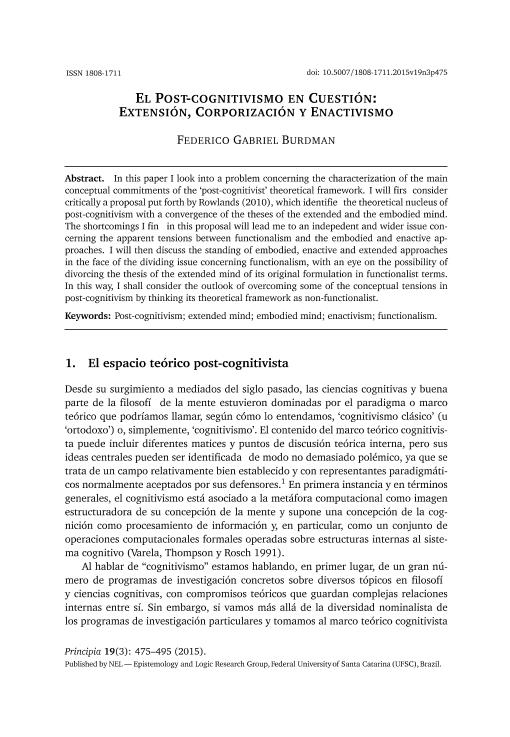Mostrar el registro sencillo del ítem
dc.contributor.author
Burdman, Federico Gabriel

dc.date.available
2020-04-28T16:16:45Z
dc.date.issued
2016-03
dc.identifier.citation
Burdman, Federico Gabriel; El post-cognitivismo en cuestión: Extensión, corporización y enactivismo; Universidad Federal de Santa Catarina; Principia; 19; 3; 3-2016; 475-495
dc.identifier.issn
1414-4247
dc.identifier.uri
http://hdl.handle.net/11336/103776
dc.description.abstract
En este trabajo abordo el problema de cómo caracterizar los compromisos conceptuales centrales del marco teórico post-cognitivista.Tomaré como punto de partida la consideración crítica de la propuesta presentada por Rowlands (2010), quien identifica al núcleo teórico del nuevo espacio con una confluencia de las tesis de la mente extendida y la mente corporizada. Los problemas que encuentro en esta propuesta me llevarán a plantear una cuestión independiente y más general respecto de las tensiones que parece haber entre las ideas funcionalistas y los enfoques corporizados y enactivos. Discutiré entonces la relación entre las concepciones corporizadas, enactivas y extendidas ante la cuestión divisoria del funcionalismo, con especial atención a la posibilidad de desligar la tesis de la extensión de su formulación original en términos funcionalistas. De este modo, consideraré la perspectiva de superar algunas tensiones conceptuales dentro del marco post-cognitivista si lo pensamos como un marco no-funcionalista.
dc.description.abstract
In this paper I look into a problem concerning the characterization of the main conceptual commitments of the ‘post-cognitivist’ theoretical framework. I will firs consider critically a proposal put forth by Rowlands (2010), which identifie the theoretical nucleus of post-cognitivism with a convergence of the theses of the extended and the embodied mind. The shortcomings I fin in this proposal will lead me to an indepedent and wider issue concerning the apparent tensions between functionalism and the embodied and enactive approaches. I will then discuss the standing of embodied, enactive and extended approaches in the face of the dividing issue concerning functionalism, with an eye on the possibility of divorcing the thesis of the extended mind of its original formulation in functionalist terms. In this way, I shall consider the outlook of overcoming some of the conceptual tensions in post-cognitivism by thinking its theoretical framework as non-functionalist.
dc.format
application/pdf
dc.language.iso
spa
dc.publisher
Universidad Federal de Santa Catarina
dc.rights
info:eu-repo/semantics/openAccess
dc.rights.uri
https://creativecommons.org/licenses/by-nc-sa/2.5/ar/
dc.subject
Post-cognitivismo
dc.subject
mente extendida
dc.subject
mente corporizada
dc.subject
funcionalismo
dc.subject.classification
Otras Filosofía, Étnica y Religión

dc.subject.classification
Filosofía, Ética y Religión

dc.subject.classification
HUMANIDADES

dc.title
El post-cognitivismo en cuestión: Extensión, corporización y enactivismo
dc.type
info:eu-repo/semantics/article
dc.type
info:ar-repo/semantics/artículo
dc.type
info:eu-repo/semantics/publishedVersion
dc.date.updated
2020-03-11T13:06:32Z
dc.identifier.eissn
1808-1711
dc.journal.volume
19
dc.journal.number
3
dc.journal.pagination
475-495
dc.journal.pais
Brasil

dc.journal.ciudad
Florianópolis
dc.description.fil
Fil: Burdman, Federico Gabriel. Instituto de Investigaciones Filosóficas - Sadaf; Argentina. Consejo Nacional de Investigaciones Científicas y Técnicas; Argentina
dc.journal.title
Principia

dc.relation.alternativeid
info:eu-repo/semantics/altIdentifier/url/https://periodicos.ufsc.br/index.php/principia/article/view/1808-1711.2015v19n3p475
dc.relation.alternativeid
info:eu-repo/semantics/altIdentifier/doi/http://dx.doi.org/10.5007/1808-1711.2015v19n3p475
Archivos asociados
